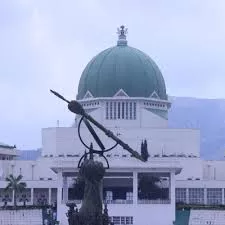
DETAILS OF BILL ON CREATION OF LOCAL GOVERNMENT ELECTORAL COMMISSION. BEFORE THE SENATE
Details of the new bill proposed on the floor of the Senate on Thursday seeking to create an Independent Electoral body charged with the responsibility to conduct Local Government Council elections have finally emerged.
The bill which was titled, “Local Government Independent Electoral Commission (Establishment) Bill, 2024 (SB. 531)”, was sponsored by the Chairman, Senate Committee on Finance, Sen. Mohammed Sani Musa, (APC, Niger-East).
The bill stated in part:
“To establish the National Independent Local Government Electoral Commission (NILGEC) responsible for conducting elections to the office of the Local Government Chairman and Councillors, and any other matter thereof to do with local government as a third tier of government.
“The National Independent Local Government Electoral Commission (NILGEC) is hereby established as an autonomous body mandated to organize, oversee, and conduct elections for the offices of Local Government Chairman and Councillors across all states.”
Also listed in the bill are the functions and powers of NILGEC which include conduct of free, fair, and transparent elections for Local Government Chairman and Councillors.
The bill went on to state further as follows:
“To prepare and maintain an accurate and up-to-date voter register.
“To ensure voter education and public awareness regarding the electoral process.
“To set and enforce electoral guidelines and regulations for Local Government elections.
“To recruit and train electoral officers and staff for efficient election management.
“To monitor and supervise all electoral activities and processes.
“To investigate and adjudicate electoral disputes and grievances.”
As proposed by this piece of legislation, NILGEC shall consist of a Chairperson and six Commissioners, to be appointed by the President with the confirmation of the Senate.
It states, “The Chairperson and Commissioners shall serve for a term of five years, renewable once.”
The bill also proposed independence and autonomy for NILGEC when it states that NILGEC shall operate independently, free from external influence and interference.
“The Commission shall have its own budget, approved by the National Assembly, to ensure financial independence”, it states.
Also considered is the electoral process and procedures when the bill states that NILGEC shall develop and implement procedures for voter registration, candidate nomination, and the conduct of elections.
It stated, “NILGEC shall ensure the provision of necessary electoral materials and logistics for the smooth conduct of elections.
“NILGEC shall announce the election schedule at least six months before the date of the election.
“Elections for the offices of Local Government Chairman and Councillors shall be conducted every four years.”
Electoral offenses and penalties were not left out in the proposed bill, it explained that NILGEC shall define and enforce penalties for electoral offenses, including but not limited to voter fraud, ballot stuffing, and electoral violence.
“Offenders shall be prosecuted and punished in accordance with the laws of the land.
“NILGEC shall collaborate with other relevant government agencies, security forces, and civil society organizations to ensure a secure and credible electoral process.“Upon the establishment of NILGEC, all powers and functions related to the conduct of Local Government elections previously vested in any other body or authority shall be transferred to NILGEC.”
 Premium News
Premium News